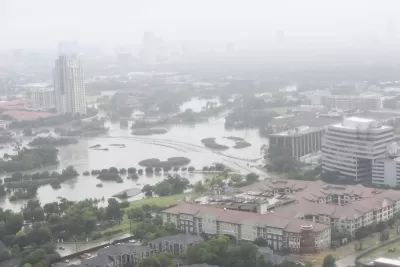Wishing Houstonians continued strength, fortitude, and safe passage this week, Hazel Borys considers resilience.

"Most of us faraway bystanders are observing Houston’s response to Hurricane Harvey with concern at the devastation as well as encouragement at the stories of compassion. With sympathy to the current human suffering from Harvey, we are wishing Houstonians continued strength, fortitude, and safe passage this week. No amount of comprehensive planning or zoning reform can prepare a city for the sort of flood Houston is currently experiencing. An expected 50” of rain in a few days makes this an event that no place in the world is likely to sustain without massive personal and economic impacts. Perhaps not even the Netherlands, who has led the world in stormwater management for hundreds of years, with protection, prevention, and preparedness."
"This volume is more rainfall in 3 days than annual amounts in very wet regions. The rainiest cities in the U.S. – Mobile, Pensacola, and New Orleans – average 67”, 65” and 64” of rain per year. Portland and Seattle average 36” and 37”. 50” in a few days is highly unusual in hurricane history, and is perhaps a 1,000-year flood. That means that there is a 1 in 1,000 chance of it happening in any given year, and not that we should only expect an event of this magnitude every 1,000 years, an important but counterintuitive distinction. Regardless of what kind of planning Houston would’ve done, preparation for this intensity is a challenge."
"A good deal of brilliance has been shone on how climate change is – and is not – involved in progressively more extreme storm events, like this piece by David Roberts. Clearly, we must both adapt and mitigate climate effects as quickly as we can. It is becoming increasingly clear that adaptation and mitigation isn’t an either/or choice."
Borys shares short interviews with two planning gurus, Ben Brown and Scott Bernstein, and points to a number of resources that may help us with our global commons problem.
FULL STORY: Hurricane Harvey provides a sober reminder that resilience is about mitigation and adaptation

Montreal Mall to Become 6,000 Housing Units
Place Versailles will be transformed into a mixed-use complex over the next 25 years.

Planetizen Federal Action Tracker
A weekly monitor of how Trump’s orders and actions are impacting planners and planning in America.

DARTSpace Platform Streamlines Dallas TOD Application Process
The Dallas transit agency hopes a shorter permitting timeline will boost transit-oriented development around rail stations.

Interactive Map Reveals America's “Shade Deserts”
Launched by UCLA and American Forests to combat heat-related deaths, the tool maps the shade infrastructure for over 360 U.S. cities.

Bicycles and Books — In Sacramento, Libraries Now Offer Both
Adult library card holders can check out e-bikes and e-trikes for up to one week.

Colorado Landfills Emit as Much Pollution as 1M Cars
Landfills are the third-largest source of methane pollution in Colorado, after agriculture and fossil fuel extraction.
Urban Design for Planners 1: Software Tools
This six-course series explores essential urban design concepts using open source software and equips planners with the tools they need to participate fully in the urban design process.
Planning for Universal Design
Learn the tools for implementing Universal Design in planning regulations.
City of Mt Shasta
City of Camden Redevelopment Agency
City of Astoria
Transportation Research & Education Center (TREC) at Portland State University
City of Camden Redevelopment Agency
Municipality of Princeton (NJ)
Regional Transportation Commission of Southern Nevada




























